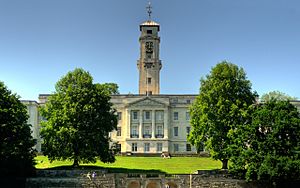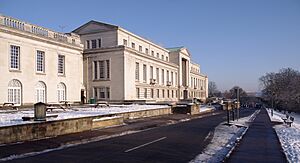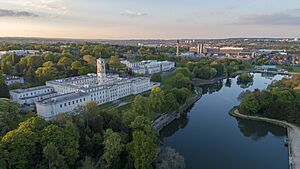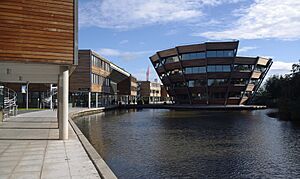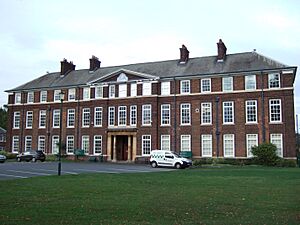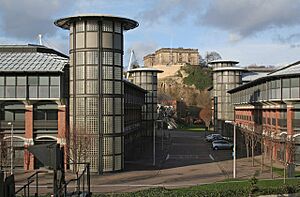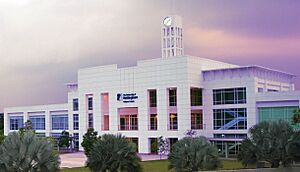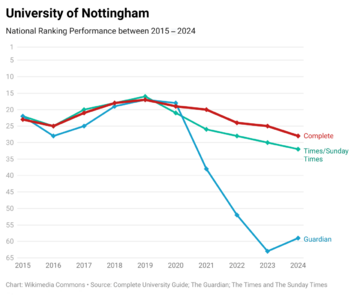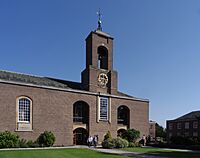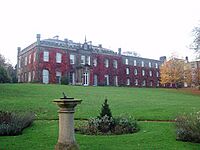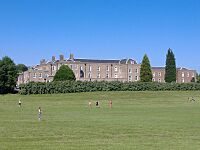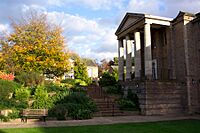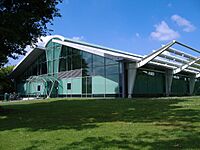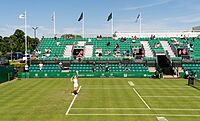University of Nottingham facts for kids

|
|
| Motto | Latin: Sapientia urbs conditur |
|---|---|
|
Motto in English
|
A city is built on wisdom |
| Type | Public |
| Established | 1881 – University College Nottingham 1948 – Received royal charter |
| Endowment | £78.1 million (2024) |
| Budget | £834.7 million (2023/24) |
| Chancellor | Lola Young, Baroness Young of Hornsey |
| Vice-Chancellor | Jane Norman |
| Visitor | Lucy Powell (as Lord President of the Council ex officio) |
|
Academic staff
|
7,220 Nottingham-based (2023/24) |
| Students | Nottingham based (2015/16) 47,953 worldwide (2019/20) |
| Undergraduates | (2015/16) |
| Postgraduates | (2015/16) |
| Location |
,
England
52°56′20″N 1°11′49″W / 52.939°N 1.197°W |
| Colours | Nottingham Blue Green Gold |
| Affiliations |
|
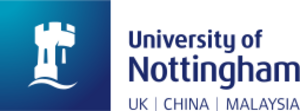 |
|
The University of Nottingham is a big public university in Nottingham, England. It started as University College Nottingham in 1881. Later, in 1948, it was officially given the power to award its own degrees.
The university has several campuses. Its main campus, University Park, is in Nottingham. There are also campuses in Semenyih, Malaysia and Ningbo, China. The university has five main groups of subjects, called faculties. These faculties include over 50 different schools and departments.
Nottingham is a large university with more than 46,000 students and 7,000 staff members. These numbers include people across its UK, China, and Malaysia campuses. Many famous people have studied or worked here. Some have even won a Nobel Prize! The university is part of important groups like the Russell Group, which includes leading research universities.
Contents
History of the University
How the University Started
The University of Nottingham began a long time ago. It started with an adult education school in 1798. Then, in 1873, the University of Cambridge began offering special lectures there.
The university officially started as University College Nottingham in 1881. At first, it helped students prepare for exams from the University of London. In 1875, a secret donor gave £10,000 to help the school grow. The city of Nottingham also agreed to build and support a new college building.
The first stone for the college was laid in 1877 by a former Prime Minister, William Ewart Gladstone. The college's beautiful old building on Shakespeare Street opened in 1881. Prince Leopold, Duke of Albany officially opened it. When it first opened, there were four professors. They taught Literature, Physics, Chemistry, and Natural Science. Over the years, many new subjects were added, like Engineering, French, and Education.
Growing and Moving Campuses
In the 1920s, the university college grew a lot. It moved from the city centre to a much larger campus. This new campus, called University Park, was finished in 1928. Sir Jesse Boot helped pay for it. He gave 35 acres of land to the city in 1921. He wanted to create a top learning place for everyone.
The new main building at University Park was the Trent Building. It is a grand white building with a tall clock tower. King George V officially opened it on July 10, 1928. During this time, famous people like Albert Einstein, H. G. Wells, and Mahatma Gandhi visited the university. The blackboard Einstein used is still in the Physics department!
The college did not change much between the two World Wars. But new departments like Slavonic Languages were added. More subjects became independent, like Electrical Engineering and Zoology.
Becoming a University
Before 1948, students at University College Nottingham got their degrees from the University of London. But in 1943, the college was given a special permission called a royal charter. This made it a full university. In 1948, it officially became the University of Nottingham. This meant it could now give out its own degrees.
In the 1940s, a farming college joined the university. It became the School of Agriculture. In 1956, the Portland Building was finished. It is another important building on campus. In 1970, the university opened the first new medical school in the UK in the 20th century.
The university has used different logos over the years. One old logo had a picture of Nottingham Castle. In 2001, the university changed its logo to the one it uses today.
Modern Day University
In 1999, the Jubilee Campus opened. It is about one mile from University Park. It was built on the old site of the Raleigh Bicycle Company. After this, Nottingham started to open campuses in other countries. The Malaysia campus opened in 1999, and the China campus opened in 2004. In 2005, the King's Meadow Campus opened near University Park.
In November 2023, the University of Nottingham became the first UK university to win an Athena SWAN Gold Award. This award is for its strong commitment to making things fair for everyone, especially regarding gender equality.
University Campuses in the UK
University Park Campus
University Park Campus is the main campus. It is about 330 acres in size. The campus has a beautiful lake and a clock tower. It is known for its lovely buildings and green spaces. University Park has won many awards for its design and landscaping. It has even been called the greenest campus in the country.
At the south entrance of University Park is the Lakeside Arts Centre. This is where the university holds public art shows and performances. It has a theatre, art galleries, and spaces for cultural events. You can see the university's old manuscripts there. It also shows art from local artists.
Jubilee Campus
The Jubilee Campus was designed by Sir Michael Hopkins. Queen Elizabeth II opened it in 1999. It is about 1 mile from University Park. This campus is home to the Schools of Education and Computer Science. The Nottingham University Business School is also here.
The Jubilee Campus is known for being environmentally friendly. It has won awards for its green buildings. The campus has modern and unique architecture. One famous structure is Aspire. It is a 60-metre tall art piece and the tallest freestanding structure in the UK.
The GlaxoSmithKline Carbon Neutral Laboratory is part of the School of Chemistry. It is the UK's first laboratory that produces no carbon emissions. A big fire happened during its building in 2014. It officially opened in 2017.
Other UK Campuses
The City Hospital Campus is for staff and students studying medicine. It focuses on areas like breathing problems and cancer. This campus grew in 2009.
The Sutton Bonington Campus is about 12 miles south of Nottingham. It houses the School of Biosciences and the School of Veterinary Medicine and Science. This campus has its own botanic gardens and lakes. The University Farm is also located here.
The King's Meadow Campus opened in 2005. It used to be a television studio. Now, it mainly holds administrative offices. The Department of Manuscripts and Special Collections is also there. A TV studio is still on site and is rented out for films and TV shows.
The Castle Meadow Campus is a large site near Nottingham Castle. The university bought it in 2021. The buildings there are being updated. This campus is planned to open from 2023.
International Campuses
Nottingham has campuses in other countries. This is part of its plan to grow. The first international campus opened in Semenyih, Malaysia, in 1999. Then, a campus opened in Ningbo, China, in 2004.
The Malaysia campus was the first campus of a British university in Malaysia. It won awards for its international work. In 2005, the Malaysia campus moved to a new, specially built site.
The Ningbo campus cost £40 million and was finished in 2005. It was officially opened by John Prescott, the UK's Deputy Prime Minister. Like the Malaysia Campus, the Ningbo Campus looks like University Park in the UK. It has a lake and its own version of Nottingham's Trent Building. It also has China's first zero-carbon building.
In 2012, the university started a new project in Shanghai, China. It offers joint courses with a Chinese university. Students can study in Shanghai and also spend time in Nottingham.
How the University is Organized
Departments and Subjects
The university has many schools and departments. They are grouped into five main faculties:
- Arts: This includes subjects like American & Canadian Studies, Modern Languages, English, History, Music, and Philosophy.
- Engineering: Here you can study Architecture, Chemical Engineering, Civil Engineering, Electrical Engineering, and Mechanical Engineering.
- Medicine and Health Sciences: This faculty includes Health Sciences, Life Sciences, Medicine, and Veterinary Medicine.
- Science: Subjects like Biosciences, Chemistry, Computer Science, Math, Pharmacy, Physics, and Psychology are here.
- Social Sciences: This covers Economics, Education, Geography, Law, Business, Politics, and Sociology.
University Leadership
The main leader of the university is the Chancellor. The top academic and administrative leader is the Vice-Chancellor. Jane Norman was announced as the new Vice-Chancellor in December 2024.
The University Council is the main governing body. It has 35 members. The Senate is in charge of academic matters. It includes senior academics and student representatives.
Academic Life and Reputation
University Rankings
| National rankings | |
|---|---|
| Complete (2021) | 26= |
| Guardian (2021) | 62 |
| Times / Sunday Times (2021) | 30= |
| Global rankings | |
| ARWU (2020) | 101–150 |
| QS (2021) |
97 |
| THE (2021) | 136= |
| British Government assessment | |
| Teaching Excellence Framework | Gold |
The University of Nottingham is a member of the Russell Group. This group includes leading research universities in the UK. It is also part of the Sutton 13 group, which are considered some of the most selective universities in the UK.
The university has won awards like "University of the Year" in 2006. It was also named "Entrepreneurial University of the Year" in 2008. In 2016–17, it was named 'University of the Year' for helping graduates find jobs.
In 2024, the QS University Ranking placed Nottingham University 97th in the world. It was also ranked 17th in the UK. Reuters ranked Nottingham as Europe's 87th 'Most Innovative University' in 2019.
- Top Subjects at Nottingham
The university is highly ranked for many subjects:
- In 2025, it was ranked #4 for Veterinary Medicine and #6 for Chemical Engineering in the UK.
- It was also #7 for Aeronautical and Aerospace Engineering, Education, and Pharmacy.
- In 2024, for Law, it was #8 in the UK and #45 worldwide.
- For Business & Economics, it was #9 in the UK and #75 worldwide.
- For Education, it was #9 in the UK and #68 worldwide.
Student Admissions
|
Nottingham is one of the largest universities in the UK. It has many students from over 130 countries. In 2022, the university offered places to 67.7% of its undergraduate applicants. This means it is quite selective.
Student Life at Nottingham
Students' Union and Activities
The University of Nottingham Students' Union helps organize many activities. There are over 190 student clubs and societies. Students can join groups for hobbies, interests, or academic subjects. There are also 76 sports clubs.
Nottingham students compete in the Varsity Series. These are sports events against Loughborough University and Nottingham Trent University.
The student newspaper is called Impact. It is published regularly during term time. The students also have their own radio station, University Radio Nottingham. There is a student theatre called The New Theatre. Students also run a company that provides sound and lighting for events.
The Students' Union also helps students volunteer in the local community. Over 4500 students volunteer each year. They help in schools and other organizations. The Union has a large charity fundraising group called "Karnival." In 2012, they raised £1.61 million for charity.
Student Housing
The University of Nottingham has many student halls of residence. These are places where students live on campus. The halls are often named after places in the East Midlands. Some are also named after important people linked to the university.
Sports Facilities
The David Ross Sports Village is a big sports centre. It opened in October 2016. It has a 25-metre swimming pool and a health suite.
Famous People from Nottingham University
-
D.H. Lawrence, novelist
-
Sir Peter Mansfield, physicist who was awarded the 2003 Nobel Prize in Physiology or Medicine
-
Sir Ian Kershaw, historian and expert on Adolf Hitler and the Third Reich
-
Sir Martyn Poliakoff, research professor in chemistry known for The Periodic Table of Videos
-
Sir Clive Granger, economist awarded the 2003 Nobel Memorial Prize in Economic Sciences
-
Members of the band London Grammar
Many well-known people have studied or worked at the University of Nottingham. These include Nobel Prize winners like Sir Clive Granger (Economics, 2003) and Sir Peter Mansfield (Medicine, 2003). Sir Peter Mansfield won for his work on Magnetic Resonance Imaging (MRI). Andre Geim, another Nobel Prize winner, also studied physics here. Caucher Birkar, a Fields Medal winner in mathematics, is also connected to the university.
Frederick Kipping, a chemistry professor, discovered silicone at Nottingham. Scientists at Nottingham also made big steps in growing plants in labs. They were the first to create special tomatoes in the 1980s. Other important inventions from the university include cochlear implants for deaf children. They also helped develop the "brace-for-impact" position used in airplanes. In 2015, a group called Assemble, which included a tutor from the Architecture Department, won the Turner Prize for art.
See also
 In Spanish: Universidad de Nottingham para niños
In Spanish: Universidad de Nottingham para niños
- Academic dress of the University of Nottingham
- Armorial of UK universities
- China Policy Institute
- The George Green Institute for Electromagnetics Research
- Institute of Contemporary Chinese Studies
- International Trade Awards (2007)
- List of modern universities in Europe (1801–1945)
- List of universities in the UK


